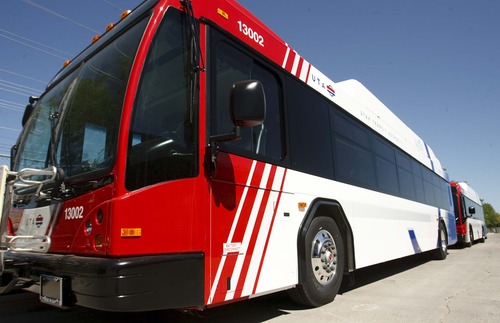This is an archived article that was published on sltrib.com in 2014, and information in the article may be outdated. It is provided only for personal research purposes and may not be reprinted.
A transit riders group asked legislators Wednesday to consider raising Wasatch Front sales taxes for transit to 1 cent per dollar — a 45 percent jump or more.
In return, it wants to require the Utah Transit Authority to provide increased services.
Christopher Stout, president of the Utah Transit Riders Union and a former Democratic U.S. Senate candidate, said UTA now offers minimal or no service late at night, on weekends and on holidays. And service isn't frequent during the day in some places, and routes often don't reach far into neighborhoods.
"Riders can't rely on the system," he told the Transportation Interim Committee, adding that his group believes low-frequency service and spotty bus coverage are why ridership is low.
Alex Cragun, also with the group, said transit systems in Denver and Minneapolis have almost identical numbers of bus and train routes and comparable fares, but their riderships are twice as high because service is more frequent and available late at night and on weekends and holidays.
Cragun said those cities also have a regional 1 cent per dollar sales tax for transit, which is likely why they can afford that better service.
David Kallas, a senior adviser to UTA, agreed. He testified that Denver and Minneapolis double UTA's ridership because all their buses come every 15 minutes during the day — while only some of UTA's do that at rush times, and others come once every 30 or 60 minutes.
"That's really the difference," Kallas said. "What prevents us from doing that is cost. You have to have more buses. You have to have more operators."
He added that UTA has a goal of eventually offering service every 15 minutes on lines. So the transit group suggested consideration of a regional 1 cent per dollar sales tax for transit. Currently, such taxes are much lower and vary from county to county.
Salt Lake County charges 0.69 cent per dollar. Utah, Davis, Weber and Box Elder counties charge 0.55 cent. And Tooele County charges 0.3 cent. Increasing them all to 1 cent per dollar would mean tax hikes of 45 percent to a 233 percent.
Stout said making the tax level uniform across the Wasatch Front also could make it easier to improve service everywhere.
Kallas said UTA is careful to provide each county with service that essentially matches the taxes and fares they pay.
Stout said that means limited service in some areas, which makes connecting there difficult for riders from around the region — which may drag down ridership everywhere.
If a tax hike is allowed, Stout said, his group would like to see UTA required to provide late-night, holiday and weekend service that is at least once per hour, 24 hours a day — with enough routes to provide service that is within a mile of all urban residents.
Kallas said UTA itself is not pushing for the tax hike. But the UTA board had made one of its official goals this year to seek full funding for its projects in the state's 2040 transportation plan, and it has said that would require a 1 cent sales tax.
Transportation Committee Chairman Johnny Anderson, R-Taylorsville, unsuccessfully pushed legislation this year to raise tax caps and allow counties to vote whether to boost transit taxes. He said he views the recommendation from the transit group to be important because it comes from frequent riders,.
Stout said his group formed after he wrote an op-ed in The Salt Lake Tribune criticizing UTA. The group drew heavy response from frequent riders who wanted to push for improved service and has been seeking solutions since then.



